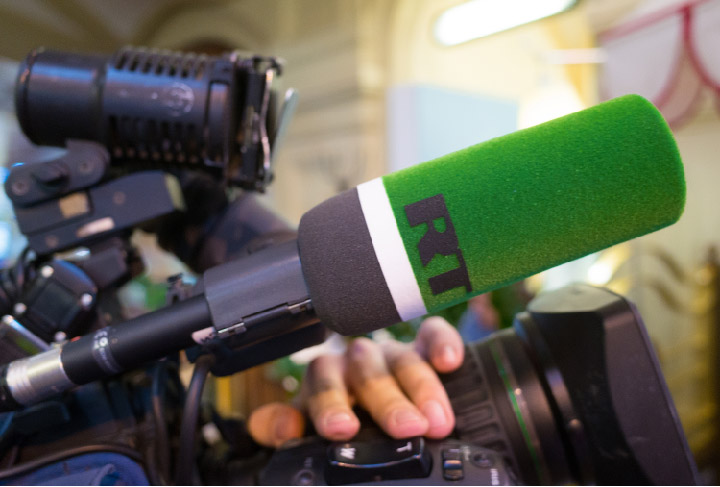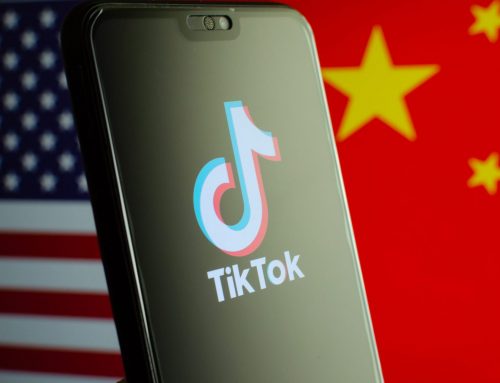Each week, ASD researchers will analyze Hamilton 2.0 data to understand the narratives and topics the Russian government and Russian state-funded media are promoting on Twitter, YouTube, broadcast television (RT), and state-sponsored news websites. This reporting will provide insight into Kremlin-backed narratives of the previous week and provide journalists, researchers and citizens with information to better shape how they view Russia’s messaging aimed at the West.
From January 25-31, Russian-linked Twitter accounts were preoccupied with the coronavirus, yellow vest protests in France, and World War II history. Russian government-funded websites also featured extensive coverage of the coronavirus, as well as political developments in India and U.S. President Donald Trump’s Middle East peace plan. Russian state-owned media broadcasts focused heavily on Brexit, and paid particular attention to dissent in Scotland and Northern Ireland.
Russian state-funded media and government and diplomatic corps accounts:
Top 10 Hashtags — January 25-31:
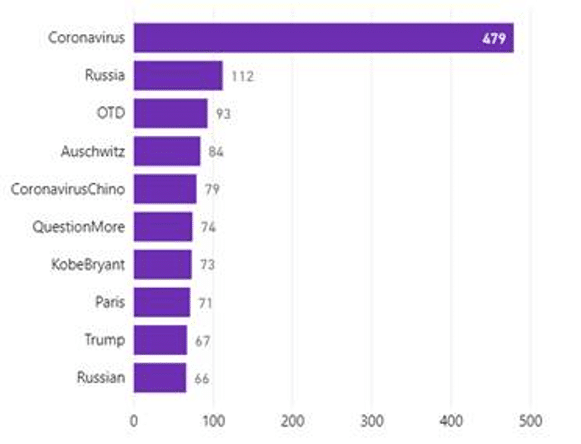
By volume, the top hashtag in Russia-linked accounts was by far #coronavirus. However, among the 10 tweets with the most retweets (as of noon on January 31), three of them were on the yellow vest protests in France, including the top tweet from Kremlin-supported media outlet Redfish:

In fact, we see a number of high engagement tweets on the protests, highlighting reports of police violence against protestors and characterizing them as part of a broader backlash against neoliberal policies:
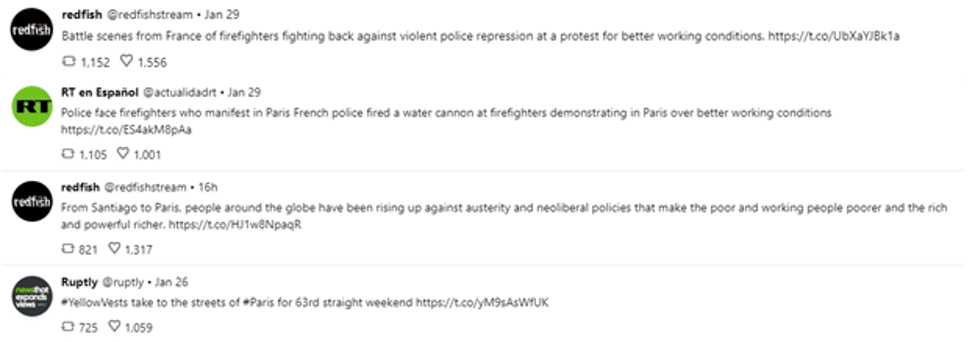
Another notable narrative to emerge last week involved World War II history, in connection with International Holocaust Remembrance Day on January 27, which is also the date on which the Soviet Red Army liberated Auschwitz in 1945. In contrast to the tweets about the protests in France, which were posted only by media accounts, both media and diplomatic/government accounts posted on this topic, although the media accounts tweeted in greater numbers and with more engagement. The primary narrative revolves around emphasis of the Red Army’s role, as well as “the truth” about events at that time — a preoccupation we have written about previously. Examples include:
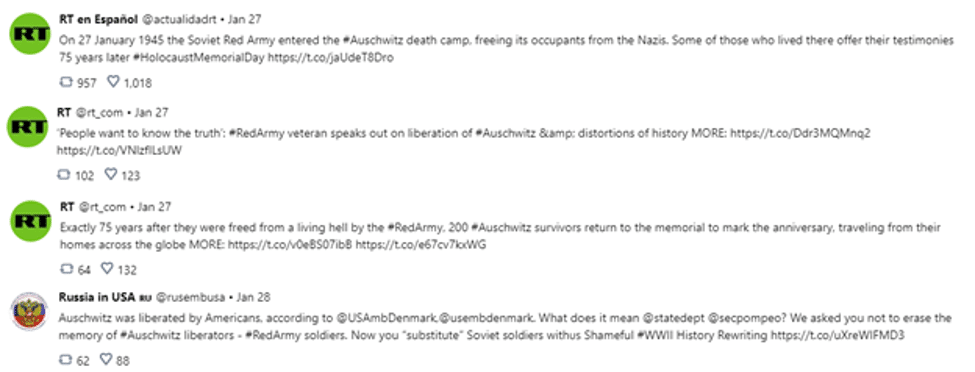
Websites
Russian government-funded websites:
Top 10 Key Phrases — January 25-31:
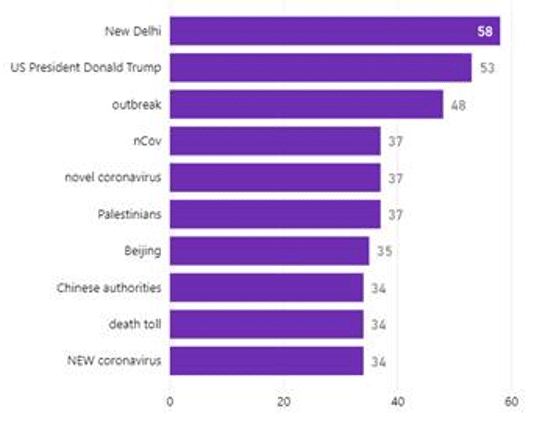
Russian government-funded websites this week featured extensive and relatively balanced reporting on the novel coronavirus outbreak. Other topics featuring prominently included updates about political developments in India and U.S. President Donald Trump’s proposed Middle East peace plan. The 58 articles mentioning New Delhi cover a wide range of topics, including upcoming parliamentary elections and the country’s new citizenship law, using the latter as an opportunity to criticize negative Western responses and “meddling” in the domestic affairs of other countries. For example:
“‘No scope for outside interference’: India tells Europe to mind its own business as MEPs consider anti-citizenship law resolutions,” RT, January 28, 2020.
“India is more than capable of handling its own matters and any outside meddling in its affairs is inappropriate and uncalled-for, India’s VP has said as the European Parliament prepares to debate India’s citizenship law . . . [VP] Naidu said that many in the West had not given the nascent democracy much of a chance back in 1947, when India gained independence from Britain, adding that the Indian nation has proved the sceptics wrong.”
Coverage of the proposed Middle East peace plan is relatively balanced, but it does highlight the criticism of the deal, particularly from Palestinians, and seeks to portray Russia as a more neutral operator in the region. A sampling of the approximately 40 posts on this topic include:
“‘We won’t be uprooted’: Mayor says Trump’s plan to make Abu Dis new Palestinian capital ‘not fair or honest’,” RT, January 30, 2020.
“Mayor of Abu Dis, the small town envisioned as the new Palestinian capital in Donald Trump’s Middle East ‘peace plan,’ told RT that Jerusalem will always be the true capital of Palestine and slammed US president for ignorance.”
“‘Jerusalem is not for sale, your conspiracy deal will not pass’ — Abbas reacts to Trump’s Middle East peace deal,” RT, January 28, 2020.
“Palestinian President Mahmoud Abbas has slammed US President Donald Trump’s Middle East peace plan, declaring ‘Jerusalem is not for sale’ and warning that the ‘conspiracy deal will not pass’ . . . The plan, he predicted, would be consigned to the ‘dustbin of history.’”
“Russia to cooperate with Palestine, Israel to resolve conflict,” TASS, January 30, 2020.
“Moscow is ready to closely cooperate with Palestine and Israel in order to resolve the conflict in the Middle East, Russian Foreign Ministry Spokeswoman Maria Zakharova said at a briefing on Thursday. . . . the Palestinians and the Israeli need to have the final say on finding a long-term and fair solution to the issue because their future [is] at stake.”
Notably, ahead of the Iowa caucus, criticism of the Democratic establishment and mainstream media continues; although, the total number of articles on this subject is quite small:
“Republicans are ‘actual demons,’ ‘zombies,’ says New York Times Nobel Prize-winning columnist,” RT, January 30, 2020.
“New York Times columnist and Nobel laureate Paul Krugman has doubled down on denouncing the Republican Party as “bad people,” insisting that there’s nothing wrong with “demonizing” opponents who “actually are demons.” Krugman refused to budge from his declaration that “Republicans are bad people”.”
“Hillary Clinton dodges attempt to serve her with Tulsi Gabbard’s defamation lawsuit…twice,” RT, January 30, 2020.
“Former US Secretary of State Hillary Clinton has twice rebuffed efforts to serve her with Democratic presidential hopeful Tulsi Gabbard’s “Russian asset” defamation lawsuit, even using the Secret Service to fend off the paperwork.”
“Warren calls for criminalizing online ‘disinformation,’ gets roasted for Orwellian overreach,” RT, January 29, 2020.
“Democratic presidential hopeful Elizabeth Warren has called for criminalizing knowingly disseminating ‘disinformation’ about voting, a move that would give the government the power to decide what constitutes truth and lies . . . The policy has raised a few eyebrows, given the candidate’s own tenuous relationship with the truth, but also the slippery slope that tends to come into play whenever censorship is involved . . . She only mentioned Russia in the [disinformation perpetrator] category, forgetting disinformation campaigns having surfaced run by the US itself and Israel, along with the usual US targets like Iran.”
This narrative also appears in a RT broadcast segment, where RT resident “media critic” Lionel (of Lionel Media) tied Elizabeth Warren’s disinformation plan to a broader effort by liberals to silence speech.
Broadcasts
Russian state-owned media:
In a week that saw the United Kingdom exit the European Union, there was an unsurprising focus on Brexit, particularly on RT UK’s YouTube channel. Just under 50 percent of the RT UK videos captured by the dashboard this week focused on Brexit, with particular attention paid to dissent in Scotland and Northern Ireland:
“Sinn Fein MEP: ‘I didn’t give my consent to the UK government dragging us out of the EU,’” RT UK, January 30, 2020.
“’I didn’t give my consent to the UK government dragging us out of the EU in the manner they’re doing”’says Martina Anderson MEP after the EU Parliament votes to ratify Boris Johnson’s #BrexitBill ahead of #BrexitDay tomorrow.”
“#BrexitDay: Brewing economic storms & Scottish mutiny as Britain sets sail from the EU,” RT UK, January 30, 2020.
“#BrexitDay: Brewing economic storms & Scottish mutiny as Britain sets sail from the EU.”
In addition, the UK government’s decision to allow Huawei into its network received significant coverage on both RT America and RT UK’s channels. Just over 12 percent of the week’s videos focused on the decision, with the majority of the coverage portraying U.S. lobbying efforts as self-serving:
“Bill Mew on Huawei decision: ‘US are scaremongering as they’re in a trade with China,’” RT UK, January 29, 2020.
“‘Scaremongering and trade tactics by the US who are currently in a trade war with China’ says privacy activist and technology expert Bill Mew as Huawei will be part of the UK’s 5G network rollout.”
“UK approves participation of Huawei in 5G network despite US threats,” RT UK, January 29, 2020.
“UK approves participation of Huawei in 5G network despite US threats.”
There were also a handful of RT videos covering U.S. politics ahead of the Iowa caucus that levied criticism at the Democratic establishment, Democratic candidates, and the mainstream media:
“DNC leaders see Bernie Sanders as ‘existential threat,’” RT America, January 29, 2020.
““Supporters of Democratic primary presidential contender Sen. Bernie Sanders (I-Vermont) are outraged by DNC Chairman Tom Perez’s appointment of establishment figures to certain important positions ahead of the party convention, including 2016 Clinton campaign chair John Podesta. Critics fear that these appointments unfairly undermine Sanders and are aimed at preventing his nomination.”
“Sanders, Warren likely to fly in private jets from DC to Iowa,” RT America, January 29, 2020.
“Climate change is real. So is the hypocrisy.”
“CNN goes too far mocking Trump’s base,” RT America, January 28, 2020.
“Former Georgia state Rep. LaDawn Jones and GOP strategist Melik Abdul join News.Views.Hughes to discuss a widely-condemned panel on CNN wherein contributors affected southern accents and mocked Trump’s base as uninformed.”
Finally, as we have noted in the past, RT rarely covers Russia or Russian issues. This week was particularly noteworthy, however, as none of the 106 videos we captured focused on Russia. This again highlights the fact that Russia’s efforts focus on repelling audiences from the West as opposed to attracting them to Russia.
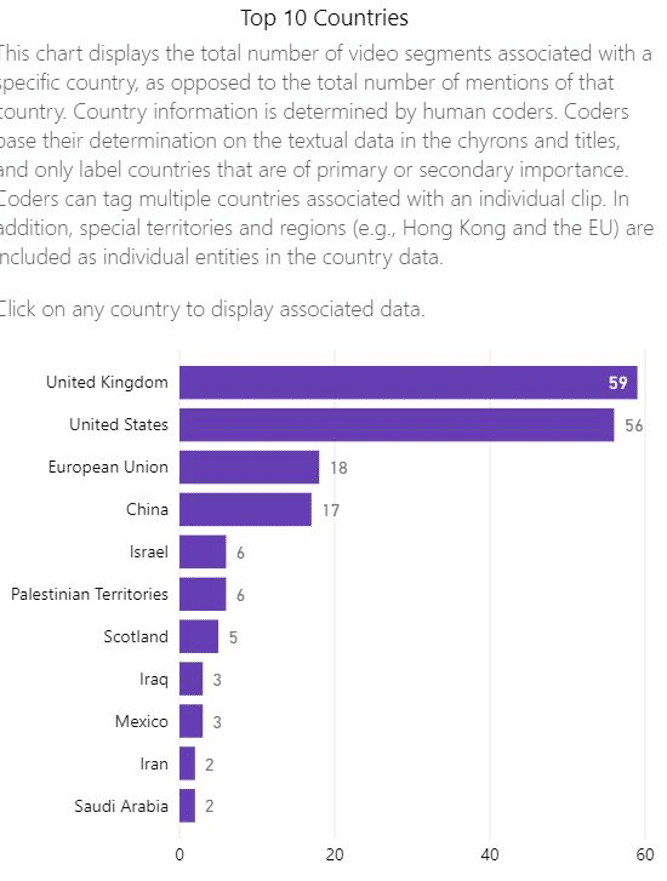
The Hamilton 2.0 dashboard tracks Russian government-backed information operations online and on state-sponsored broadcast television. The interactive, publicly accessible dashboard captures content from more than 140 diplomatic and media accounts on Twitter, four state-sponsored news websites, RT’s television news broadcasts, and RT America and RT UK’s YouTube channels.
The views expressed in GMF publications and commentary are the views of the author alone.

